Key takeaways:
- Compliance in cannabis retail is crucial for legal operations, customer safety, and building trust within the community.
- Regular employee training and ongoing education help create a knowledgeable staff, reducing errors and fostering a responsible environment.
- Conducting routine audits and engaging with industry experts are effective strategies for maintaining compliance and ensuring preparedness for inspections.
- Creating a collaborative culture around compliance through team meetings can enhance accountability and streamline processes.
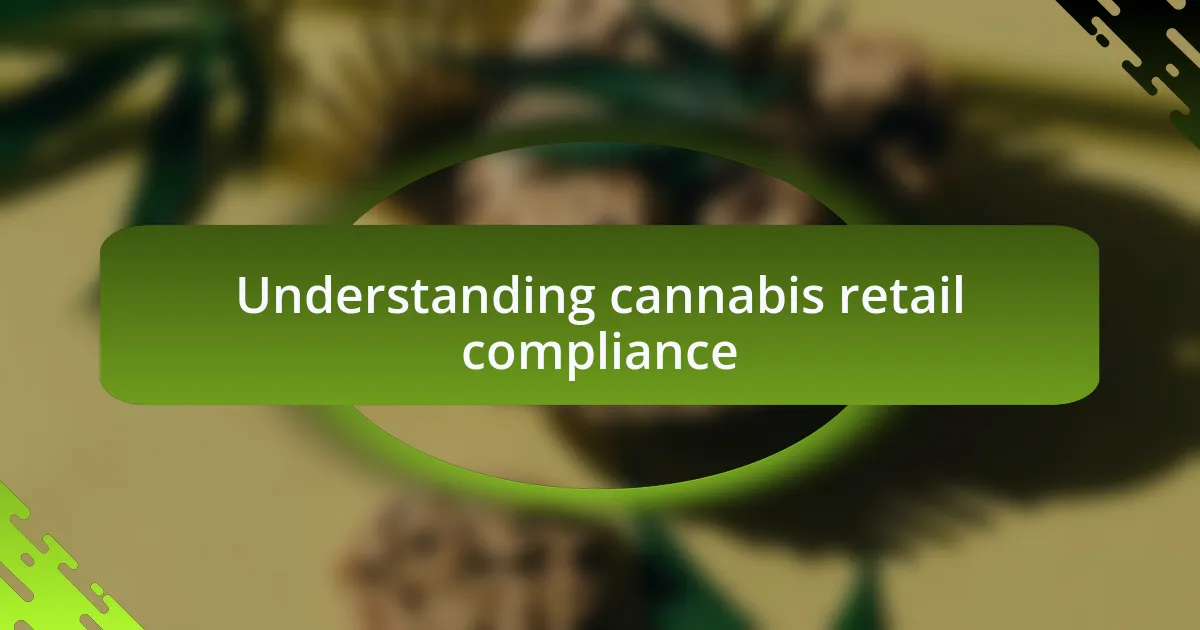
Understanding cannabis retail compliance
Understanding cannabis retail compliance can feel overwhelming, especially given the constantly changing regulations. I remember my own anxiety when I first navigated the maze of laws and guidelines. It made me question—how can I ensure I’m doing everything right to protect my dispensary and my customers?
Compliance means staying up-to-date with state regulations, local laws, and federal guidelines, which often vary widely. I found it helpful to create a checklist of compliance requirements specific to my location, and it became a reassuring tool that guided my daily operations. As I reviewed my processes regularly, I noticed not just legal benefits, but a deeper connection with my community, fostering trust with my customers.
Another essential part of compliance is employee training. I made it a priority to invest time in educating my staff about compliance practices. This not only reduced the risk of errors but also ignited a sense of pride among my employees. Have you ever witnessed the transformation in a team that understands the importance of their role in maintaining standards? It’s remarkable how empowered they feel when they know they are contributing to a responsible and safe environment.
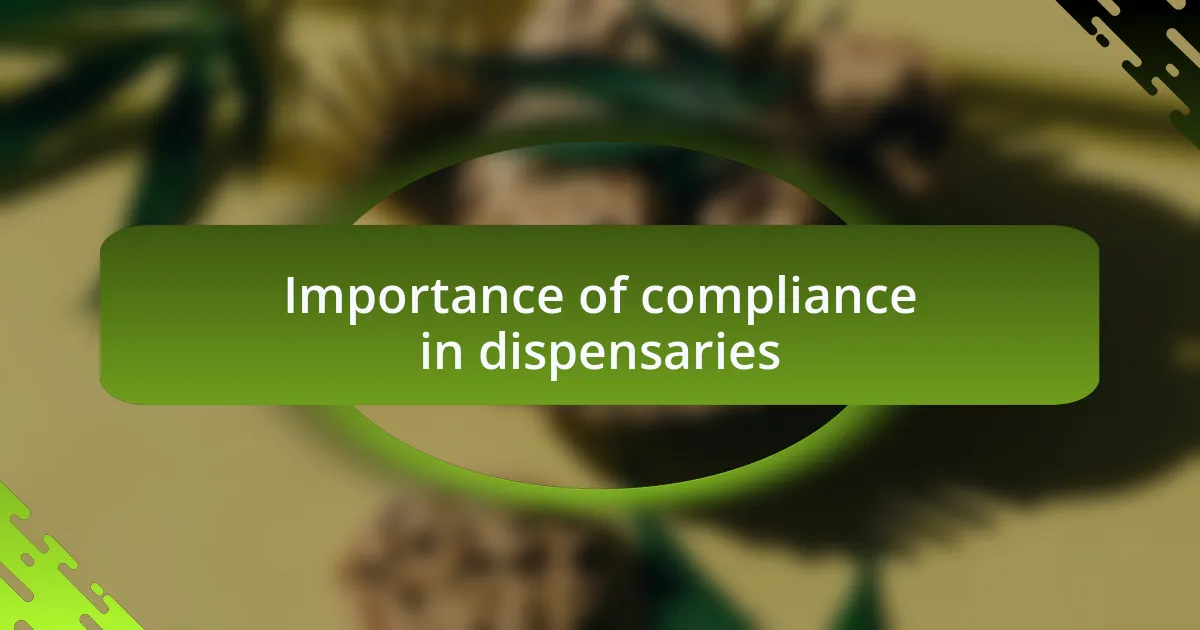
Importance of compliance in dispensaries
Compliance is not just a box to check; it’s the foundation of a successful dispensary. I recall a time when a minor oversight in labeling almost led to a hefty fine. It served as a wake-up call, reminding me that adhering to rules helps safeguard not just my business, but my customers’ health and safety.
Moreover, compliance builds credibility in a market where trust is everything. I remember the first time a customer expressed relief knowing we met all regulatory standards. That moment highlighted how compliance goes beyond legality; it fosters relationships. When customers see a dispensary committed to following the law, they feel more confident and secure, ultimately leading to loyalty.
Failing to comply can result in serious consequences, including loss of license or, worse, criminal charges. A fellow dispensary owner I know experienced this firsthand. It was a harsh reminder of why I diligently review my compliance measures. After all, isn’t it worth investing time to ensure that we’re not just operating legally but thriving?
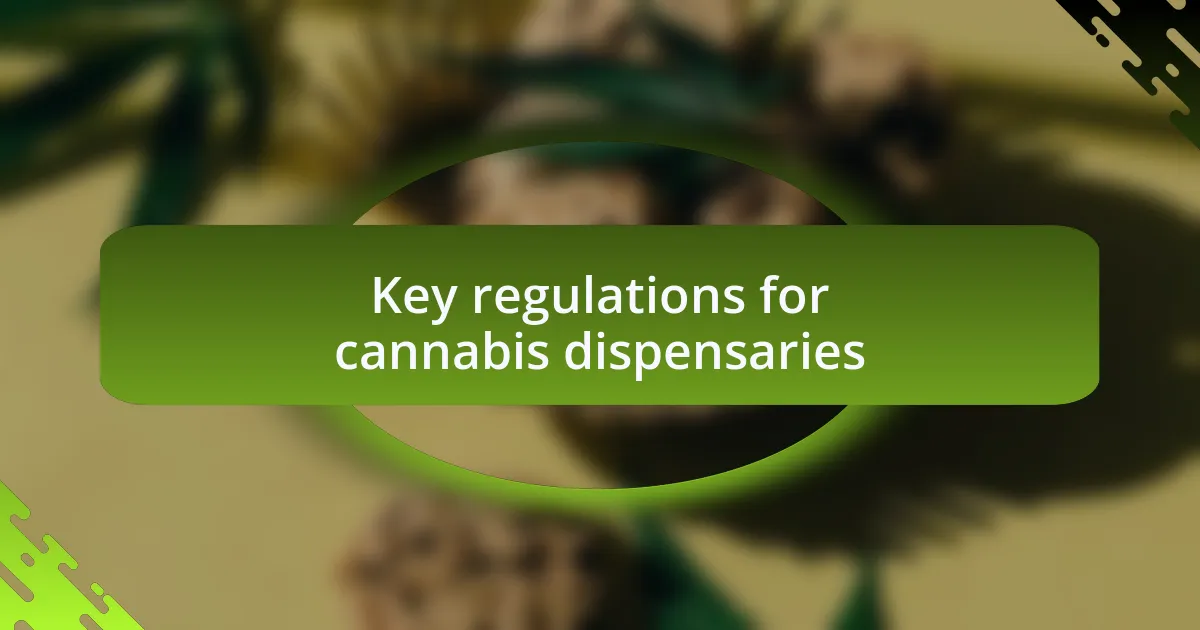
Key regulations for cannabis dispensaries
Key regulations for cannabis dispensaries often revolve around strict licensing requirements, which can vary significantly from state to state. I’ve had to navigate through a maze of documentation when applying for my dispensary license, and I can tell you it’s not for the faint of heart. Have you ever felt overwhelmed by paperwork? It’s crucial to ensure that you meet all local and state requirements, as even a missing signature can delay your operations.
Another essential regulation involves inventory management and traceability. I recall when we implemented a tracking system that logs every product from seed to sale. This transparency not only keeps us compliant but also enhances customer trust. It’s curious how a simple software solution can make such a profound difference in managing compliance, wouldn’t you agree?
Lastly, marketing regulations are something I constantly keep an eye on. There are strict rules regarding how we can promote our dispensary and its products. I remember a time when I wanted to run a social media campaign, only to discover that certain claims about our products were prohibited. This experience taught me the importance of understanding advertising regulations, ensuring that we present ourselves accurately without crossing any legal boundaries. How do you ensure your marketing stays compliant? It’s a challenge we all face in this evolving industry.
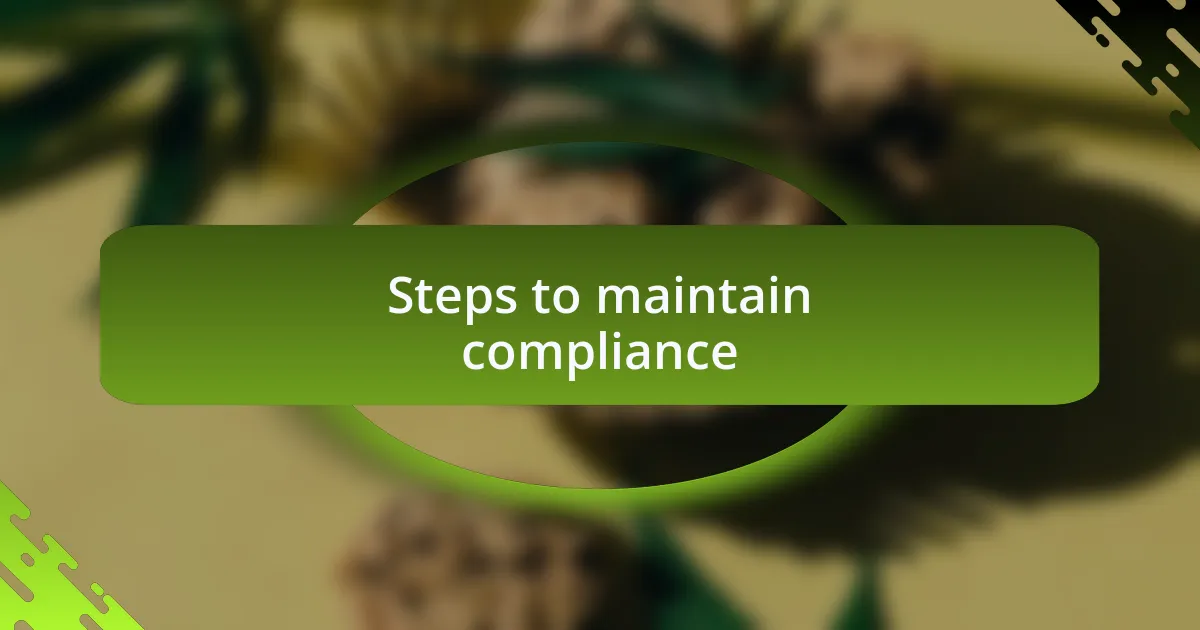
Steps to maintain compliance
One of the first steps I take to maintain compliance is regularly updating our employee training programs. I can still feel the anxiety during our initial training sessions, wondering if everyone grasped the complexities of regulations. By providing ongoing education, I ensure that my team understands their responsibilities and stays informed about any changes. Do you think your staff is well-prepared to handle compliance issues?
Routine audits are another crucial part of my compliance strategy. I remember the relief I felt after conducting our first internal audit, identifying areas for improvement well before an official inspection. This proactive approach not only reassures me but also fosters a culture of accountability within my team. How do you approach audits to ensure you’re always ready for the unexpected?
Lastly, I make it a point to engage with industry experts and legal advisors. I once sought advice from a compliance consultant after encountering an ambiguous regulation that left me scratching my head. Their insights illuminated the path forward and underscored the value of having knowledgeable allies. Are you leveraging the expertise available to you? Connecting with the right people can make a world of difference as you navigate the compliance landscape.
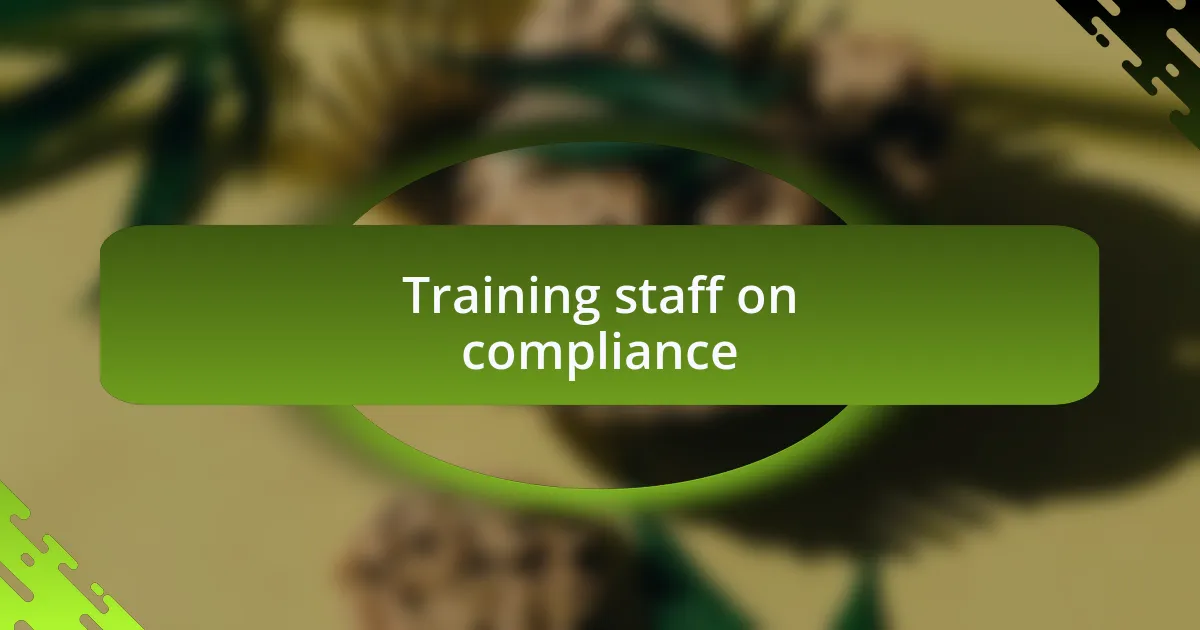
Training staff on compliance
Training staff on compliance is an ongoing journey rather than a one-time event. I remember the first time I brought in a guest speaker to address compliance at our training session. The participants were glued to their seats, absorbing knowledge in real-time. It struck me how investing in expert-led sessions can spark enthusiasm and understanding about the ever-evolving regulations. Are your training resources tapping into the potential of engaging presentations?
Incorporating practical scenarios during our trainings has proven invaluable. I often share real-life compliance challenges we’ve faced, allowing staff to brainstorm solutions together. This interactive approach not only reinforces their learning but also builds team cohesion. How can you create an environment where your team feels comfortable discussing compliance situations openly?
Another key element is the feedback loop. After every training, I ask my staff what they found helpful and what could be improved. This creates a dialogue that empowers them to take ownership of their compliance responsibilities. I recall a moment when a staff member suggested a new training method that we implemented, and it significantly boosted engagement levels. Are you actively seeking your team’s input to refine your compliance training?
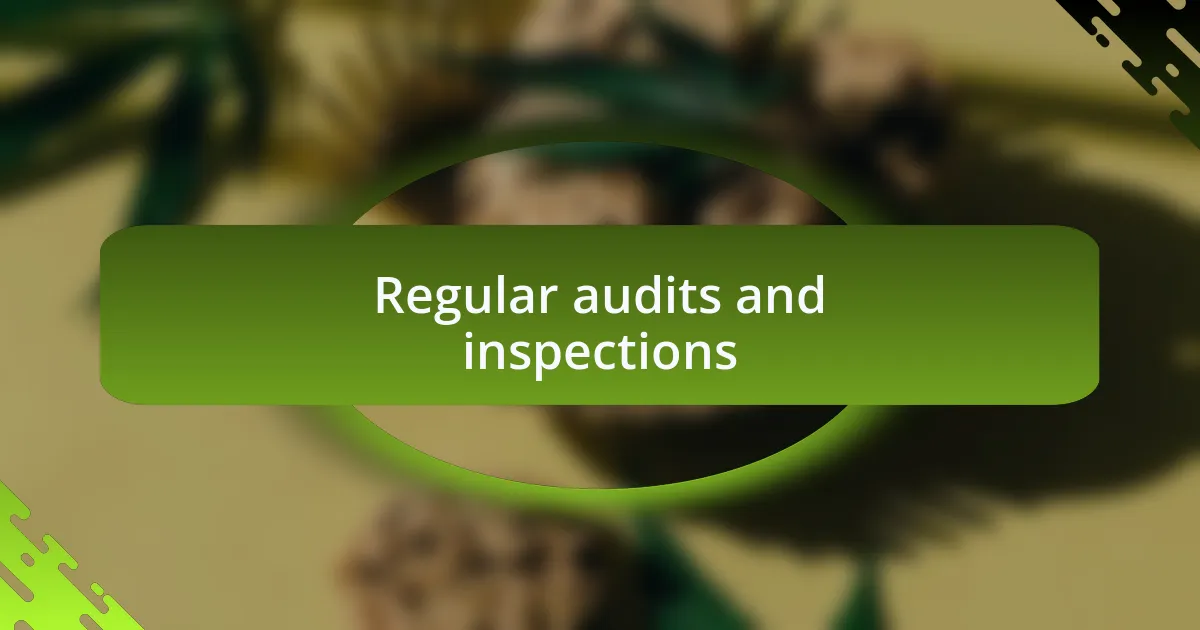
Regular audits and inspections
Regular audits and inspections are essential for maintaining compliance in a dispensary. In my early days of operating, I remember scheduling my first internal audit. The anticipation was nerve-wracking, but seeing how it illuminated areas for improvement was a turning point. How often do we truly scrutinize our own practices?
During each audit, I take a deep dive into every aspect of the operation, from inventory management to staff procedures. It’s always gratifying to uncover small victories, like a 100% accuracy rate in inventory counts. However, I have also pinpointed flaws that required immediate attention, underscoring the importance of this process. What aspects of your dispensary could benefit from fresh eyes?
Conducting external inspections brings its own level of intensity, but I’ve learned to view them as a partnership rather than a stressor. I recall a time when an inspector pointed out some regulations we had overlooked. Rather than feeling defeated, I was grateful for the insight, which ultimately made us a stronger business. Are you viewing these inspections as opportunities for growth rather than just compliance checks?

My personal compliance journey
My journey to compliance has been a blend of learning and adaptation. I still recall the first time I navigated the daunting sea of regulations; it felt overwhelming. I remember sitting at my desk, pouring over countless documents, questioning if I could ever fully grasp everything. Have you ever faced a moment where everything seems too complex to unravel?
As I tackled compliance, I found that establishing a clear system for tracking regulations was crucial. I decided to create a comprehensive checklist that not only outlined each requirement but also included deadlines and responsible team members. This approach transformed compliance from a nebulous concept into a tangible process. Have you considered how organization can change your perspective on compliance?
Over time, my compliance journey turned into a shared experience within my team. We started having monthly compliance meetings, where everyone contributed insights and suggestions. This collaborative environment not only eased my burden but also empowered my staff. Isn’t it fascinating how teamwork can foster a culture of accountability and ownership?